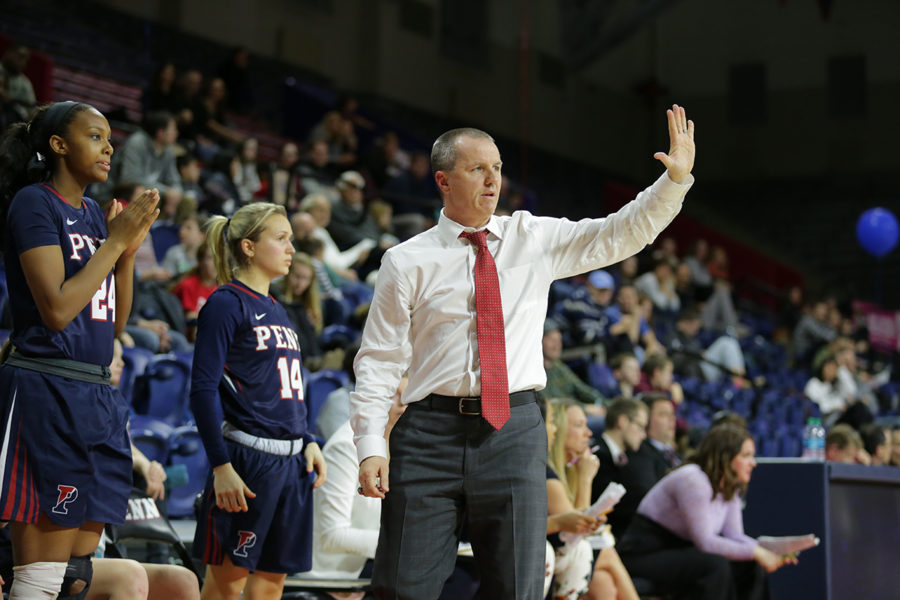
University of Pennsylvania - Women's Basketball vs Brown
Going solely by the odometer, getting from Northeast Philadelphia to the University of Pennsylvania isn’t all that far.
But if you’re talking about journeys, it can be a much longer haul.
Welcome to Mike McLaughlin’s world.
The 52-year-old Holmesburg guy is about to enter his 10th season as the Quakers’ women’s basketball coach. An extremely successful coach, who spent 14 record-setting years at his alma mater, Division II Holy Family, before that. This, from someone who readily acknowledges that he didn’t know too much about the women’s game prior to that. He was just someone who’d grown up with a basketball almost always in his hands, expecting to somehow do something with his life that involved his favorite sport.
Should we mention that he somehow managed to survive being coached (at the age of 10) by the person writing this story? Which, as hurdles go, could be a deal-breaker.
“I’ve wondered about that myself,” he smiled during a recent interview. “I guess it hasn’t held me back.”
No way. Which makes yours truly rest easier at nights.
The 5’9” McLaughlin was one of the best point guards in Holy Family history, following a disappointing high-school career at Father Judge, where he dealt with injuries. He would spend three years traveling the globe with the Harlem Globetrotters, as a member of the Washington Generals, who still haven’t won a game in forever. But as experiences go, it was all good.
“I could talk for hours about everything I got to do with them,” McLaughlin remembers. “Here’s a kid from Pennypack Street, and at 23 my first trip is to Russia. I was in awe of the situation. I was nervous. These were people I saw on television, or cartoons. So, it was intimidating. Think of every adjective you can use to describe it, and that was me. I was scared. It was about, ‘Did I deserve to be there?’ All the other players were from major universities. At the time, I might have been the only guy from Division II (actually NAIA back then).
“There was a scout in our region, Al Clocker, who’s still around, and he found me somehow. I’ve had many conversations with him since. And I always tell him I can’t thank him enough. I was in the right spot at the right time.
“I played in about 50 countries, in front of massive audiences. It was OK if we never won. We had some chances, but then we had to let them go … I was a kid from the neighborhood, living a dream. I was satisfied. I’d felt I’d reached my pinnacle. And then, I thought I’d have to go in another direction.”
He just didn’t know what that might turn out to be. But the assistant coach at his alma mater, Kathy Killian, needed to fill a part-time position on her staff. He took it. And when she ended up resigning a little over a year later, Athletic Director Sandy Michael offered him the job. To his surprise. So, in 1995 he became the program’s third coach. The rest, well, has been nothing but up. That part of it didn’t surprise him.
“I was a competitive athlete,” McLaughlin said. “I thought I could do anything. I didn’t see anything in front of me I could not do. I knew I was going to be heavily involved in the sport. It’s all I did when I was little. Basketball was on my mind 24/7. It motivated me, every day. I just wanted to be the best.”
His winning percentage at Holy Family was .870 (407-61), the highest in the NCAA at any level. Men or women. He was also the fastest in women’s history at any level to reach 400 victories. His teams never won fewer than 25 games. Six times the Tigers won at least 30.
Yet at some point, he realized it was time to challenge himself at a higher level. That’s what competitive people do.
“In high school, things just didn’t go my way,” he said. “I was resilient. I found a way to get it done. Then there comes a time when you have to change gears. I represented my school for three years with the Generals. Before every game, they announced your name, state and who you played for. That was powerful. I don’t know many people outside of Northeast Philly who’d ever heard of Holy Family. Then I got to represent my school as a coach. I had stability. I came from stability. That’s important to me. We had three kids (two daughters). I want to be accountable for everything I do. And you want to be comfortable with your surroundings.”
McLaughlin had other opportunities before Penn—which is Division I but doesn’t grant athletic scholarships—came along. In his first first season, the Quakers only won twice. Their win total would improve in each of the next seven years. He’s gone 155-109, and the last seven have been the Quakers’ best such stretch ever. They’ve won three Ivy League titles and reached the postseason six times.
“At Holy Family, it was new to me,” he explained. “And frankly, some of the girls were only seven or eight years younger than me. It was trial and error. I talked to people. I’m not afraid to ask. I’m a sponge. I think we all share and copy each other pretty good. I think if you think you invented it, you don’t last very long. I can look at other ideas and try to make them my own.
“After about five years (at Holy Family), I think that’s when I realized I could do this, and be effective doing it. You start to open your eyes, as to what it could be. My goals have remained the same: get to the top. I can see how far it’s taken me.”
And now he goes to work every day in the cathedral known as the Palestra. It’s not a privilege to be taken lightly. He appreciates all that goes with that.
“I’m part of history,” McLaughlin gushed. “What Philly kid didn’t want to be part of the Big Five? Probably everyone who reads this gets that. And I have the keys to the building. And Penn is one of the best academic universities anywhere. It’s the whole culture. But humility leads the way with me. That’s the only way you get better. Again, you ask yourself if you’re right for this. I didn’t doubt myself. But if you don’t push yourself you’ll never know what could happen. I’m OK with failure. But I never looked back.
“If you do things right, and bring in the right people, anything’s possible. Penn was patient with me. I went from 30 wins at Holy Family my last year to two my first year at Penn. And when I look back, it was one of my best years of coaching. The players were great, I was excited every day and we were building something. It was just the environment. Now we have banners hanging up and pictures of the girls on the walls in the corridors. We’re just adding to what I hope is a long legacy. But some of my best memories are from the first season. I’m still close with many of them.”
Maybe someday it will be time for him to move on once again. For the time being, he’s doing what he wants, where he wants. And no one has to remind him just how lucky he is. Still, he’s earned it. Which is maybe the best part of the narrative.
“I get to coach against (Villanova’s legendary) Harry Perretta,” McLaughlin said. “And we talk all the time. He can tell stories. But when we play I want to kick his butt and he wants to kick mine. Then we move on. And then he’ll tell me what I should have done. That’s why I love him. Where else do you get that?
“I’m not a pessimistic guy in any sense. Everything’s great when you’re winning. But what happens when you don’t? At the end of the day, there are ceilings you can hit. I know what I know. And what I do know is the women’s game is very good. I respect people who say it’s much different from the men’s game. You get that question, could you coach the men? I kind of chuckle. But it doesn’t bother me. It’s coaching people, it’s relationship building, it’s trust. We’re vulnerable. My assistants all played for me. I’m giving back to them. They sacrificed a lot for me …
“If my record is in the first paragraph of my story, then I’m probably not doing a good enough job. I know that’s obviously a part of it, but I just want them to say it at the end. I’m not naïve. We’re not playing for participation trophies. But that can’t be my legacy.
“I want to bring in quality kids,” he went on. “Would I bring in a kid if we weren’t keeping score? I ask myself that. I think people might bring in kids who aren’t a fit because they might mean one or two more wins. I might be wrong about a kid in how she’s going to matriculate as a player. But there’s been very few times when I’ve been wrong about the type of kid she was. I can live with that.”

